Thursday, April 09, 2009
STUPID JOURNALISM TRICKS: THE CONSPIRACY THEORY CARD
Progressive Review - The other day, Politico ran a typically sneering article about the Bilderberg Group. As usual, anyone who shows the slightest interest in the hyper secret meeting of some of the most powerful people in the world is a "conspiracy theorist."
This is smug, childish, mindless establishment journalism at its worst. By any traditional standard of journalism, a secret meeting of some of the most important people in the world is news. How you handle that news is certainly debatable but to ignore it completely is simply incompetence.
Consider this. The recent G-20 conference produced over 10,000 news stories. The next Bilderberg event, about 150 - none in the conventional media according to a Google scan.
Yet how newsworthy was the G20 conference? Robert Kuttner put it well when he wrote:
"Since they began at Rambouillet, France, in 1975, these annual economic summits have been treated as momentous events, but they are memorable mostly for being forgettable. Only very infrequently, as in the 1999 Cologne summit's embrace of debt relief for the third world, do they produce lasting achievements. This Group of 20 meeting was notable only because the club of seven leading democracies plus Russia was expanded to include emerging world powers such as India, China, and Brazil. . . But the 2009 summit, whose extensive press clippings will soon be fish wrap, succeeded mainly because it managed not to fail."
Of course, nothing much may happen at this year's Bilderberg conference - to be held perhaps in Greece in either May or June (only conspiracy theorists care where or when). On the other hand, Belgian viscount and current Bilderberg-chairman Etienne Davignon pointed out to the EU Observer that the Euro was created in part by the Bilderberg Group in the 1990s, certainly more newsworthy than anything the G20 crowd has been up to lately.
One of the reasons Bilderberg is so heavily censored by the archaic media is the number of publishers and owners who attend. The Washington Post, the New York Times, LA Times and all major networks' ABC, CBS and NBC have participated. All participants are sworn to secrecy.
Bilderberg denies its existence, and all the resorts at which they hold their meetings require their employees to lie and deny they are present.
Among those reportedly present in 2007 were Donald Graham, chairman and chief executive officer of the Washington Post, Richard N. Haass, president of the Council on Foreign Relations, Henry Kissinger, David Rockefeller, John Vinocur, senior correspondent of the International Herald Tribune, Paul Gigot, editor of the editorial page of the Wall Street Journal, Nicholas Beytout, editor-in-chief of Le Figaro, George David, chairman of Coca-Cola, Martin Feldstein, president and chief executive officer of the National Bureau of Economic Research, Timothy F. Geithner, president and chief executive officer of the Federal Reserve Bank of New York, Vernon Jordan, senior managing director of Lazard Freres & Co., and Anatole Kaletsky, editor at large of the Times of London.
Any journalists who don't think such a crowd, meeting at a secret place at a secret time for secret reasons, is not worth covering deserves to have their press pass cancelled.
Kenneth P. Vogel, Politico - The highest levels of the Obama administration are infested with members of a shadowy, elitist cabal intent on installing a one-world government that subverts the will of the American people.
It sounds crazy, but that's what a group of very persistent conspiracy theorists insists, and they point to President Obama's nominee for Health and Human Services Secretary, Kansas Gov. Kathleen Sebelius, as the latest piece of evidence supporting their claims.
It turns out that Sebelius - like top administration economists Timothy Geithner, Larry Summers and Paul Volcker, as well as leading Obama diplomats Richard Holbrooke and Dennis Ross - is a Bilderberger. That is, she is someone who has participated in the annual invitation-only conference held by an elite international organization known as the Bilderberg group. . .
It is precisely that exclusive roster of globally influential figures that has captured the interest of an international network of conspiracists, who for decades have viewed the Bilderberg conference as a devious corporate-globalist scheme.
The fulminating is aggravated by Obama's preference for surrounding himself with well-credentialed, well-connected, and well-traveled elites. His personnel choices have touched a populist, even paranoid nerve among those who are convinced powerful elites and secret societies are moving the planet toward a new world order.
Their worldview, characterized by a deep and angry suspicion of the ruling class rather than any prevailing partisan or ideological affiliation, is widely articulated on overnight AM radio shows and a collection of Internet websites. . .
THE THINKER'S GUIDE TO CONSPIRACY THEORIES
Sam Smith
- A conspiracy does not have to be illegal; it can merely be wrongful or harmful.
- The term 'conspiracy theory' was invented by elite media and politicians to denigrate questions or critical presumptions about events about which important facts remain unrevealed.
- The intelligent response to such events is to remain agnostic, skeptical, and curious. Theories may be suggested - just as they are every day about less complex and more open matters on news broadcasts and op ed pages - but such theories should not stray too far from available evidence.
Conversely, as long as serious anomalies remain, dismissing questions and doubts as a "conspiracy theory" is a highly unintelligent response. It is also ironic as those ridiculing the questions and doubts typically consider themselves intellectually superior to the doubters. But they aren't because they stopped thinking the moment someone in power told them a superficially plausible answer. To ridicule those still with doubts about such matters is intellectually dishonest.
- There is the further irony that many who ridicule doubts about the official version of events were typically trained at elite colleges where, in political science and history, theories often take precedent over facts and in which substantive decisions affecting politics and history are presumed to be the work of a small number of wise men (sic). They are trained, in effect, to trust in (1) theories and (2) benign confederacies. Most major media political coverage is based on the great man theory of history. This pattern can be found in everything from Skull & Bones to the Washington Post editorial board to the Council on Foreign Relations. You might even call them conspiracy theorists.
- Other fields - such as social history or anthropology - posit that change for better or evil can come as cultural change or choices and not just as the decisions of "great men." This is why one of the biggest stories in modern American history was never well covered: the declining birth rate. No great men decided it should happen.
- Homicide detectives and investigative reporters, among others, are inductive thinkers who start with evidence rather than with theories and aren't happy when the evidence is weak, conflicting or lacking. They keep working the case until a solid answer appears. This is alien to the well-educated newspaper editor who has been trained to trust official answers and conventional theories.
- The unresolved major event is largely a modern phenomenon that coincides with the collapse of America's constitutional government and the decline of its culture. Beginning with the Kennedy assassination, the number of inadequately explained major events has been mounting steadily and with them a steady decline in the trust between he people and their government. The refusal of American elites to take these doubts seriously has been a major disservice to the republic.
- You don't need a conspiracy to lie, do something illegal or to be stupid.
Subscribe to:
Post Comments (Atom)

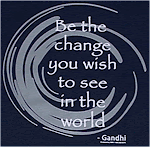




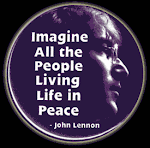


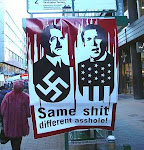
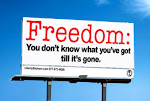








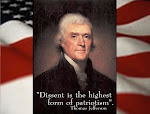
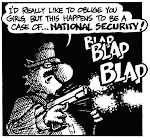






No comments:
Post a Comment